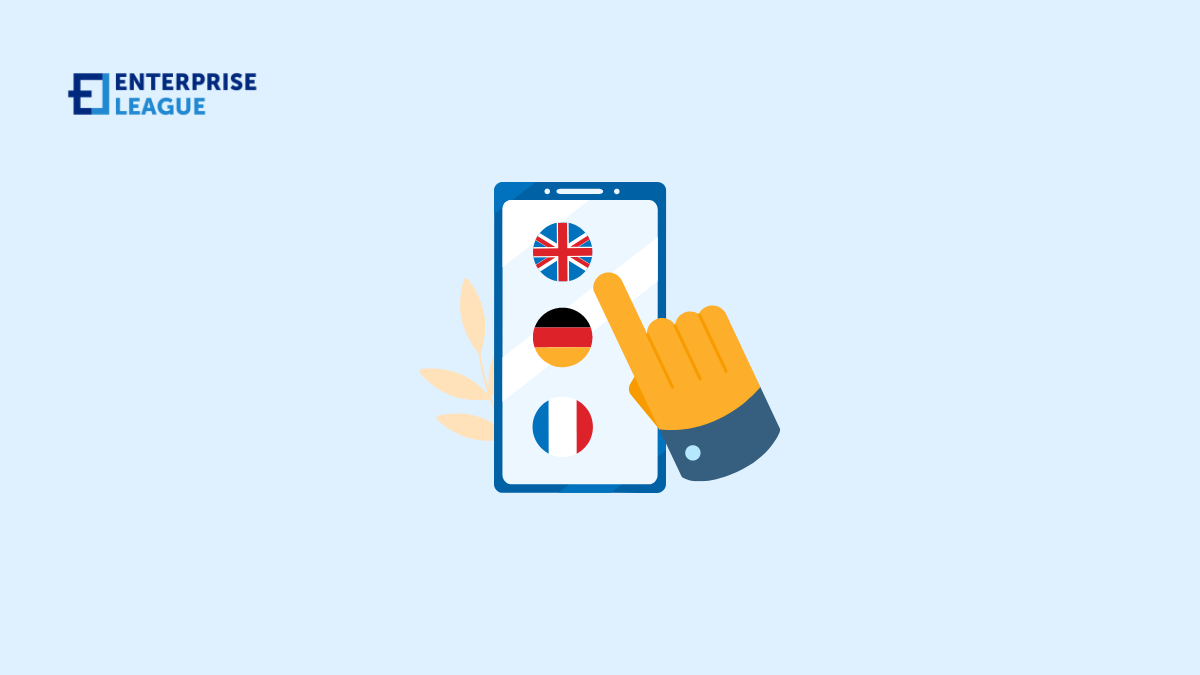Language-learning app: Pros and cons of starting a business in the educational sector
April 13, 2023

In this article, we’ll discuss the pros and cons of launching a business in the field of education, with an emphasis on language-learning apps. Among the subjects that will be covered are the rising need for education and online learning, the potential for improving people’s lives, and the prospect of generating substantial revenue. Additionally, we will examine the challenges and potential drawbacks of starting a language-learning app, providing insight for aspiring entrepreneurs in this field.
Most popular language-learning app examples
The market for applications that teach languages has gained immense popularity due to their user-friendly and effective approach. The following are some of the well-known language-learning apps:
- Duolingo: This app offers gamification techniques to make learning enjoyable and interactive for its users. Furthermore, Duolingo provides a range of language choices, such as Spanish, French, German, and others.
- Rosetta Stone: Rosetta Stone is a well-known name in language learning, with a comprehensive approach that includes speaking, reading, writing, and listening. This application provides a vast selection of languages and is especially beneficial for those seeking to attain fluency.
- Babbel: Another well-liked language-learning app is Babbel, which offers interactive lessons for a variety of languages. Babbel offers courses in more than 14 languages and focuses on practical skills that users can use in real-life situations.
- Promova: Promova is an up-and-coming language-learning app that offers personalized language courses and English grammar classes online with customized learning paths based on individual user needs. The app offers courses in various languages, including Spanish, French, Italian, and more. Promova is designed to make language learning easy and accessible for everyone.
These are merely a few illustrations of the prevalent language-learning apps accessible today. As each app has distinct features and advantages, selecting the one that suits your specific needs and learning style is crucial.
Pros of starting a business in the educational sector
The emergence of language-learning apps has led to a surge in online education demand. The following are some of the principal benefits of starting a business in the educational field:
- Growing demand for education and online learning: As the world becomes more digital, online education’s appeal is rapidly increasing. Language-learning apps, in particular, have gained popularity due to their convenience, allowing users to learn from anywhere at any time, and accommodating even the busiest schedules.
- There’s a possibility to create a beneficial effect on individuals’ lives: The creation of an educational application that equips individuals with the essential knowledge and skills required to accomplish their objectives represents a valuable prospect for making a positive difference in their lives.
- Potential for significant revenue: The educational sector is a lucrative market with the potential for significant revenue. Through the development of a thriving educational application, you can establish a consistent revenue stream utilizing subscriptions, in-app purchases, and advertising.
- Low startup costs: In contrast to conventional brick-and-mortar enterprises, initiating a business in the educational sector can be comparatively affordable. With the assistance of a proficient development team, it is feasible to design a superior app with limited initial expenses.
- Scalability: Educational apps have the advantage of scalability, meaning that they can serve many users with little additional cost. This has the potential to result in swift expansion and triumph for your enterprise.
Overall, starting a business in the educational sector can be a smart and rewarding choice for entrepreneurs. By adopting an appropriate strategy, you can establish a thriving and influential application that delivers benefits to its users and generates substantial profits.
Cons of starting a business in the educational sector
Although starting a business in the educational sector can undoubtedly offer numerous advantages, it is essential to contemplate several obstacles and disadvantages. Here are some of the main cons to keep in mind:
- High competition and market saturation: One of the biggest challenges facing any educational startup is the highly competitive nature of the market. In a saturated market with numerous established contenders like Duolingo and Babbel, differentiating oneself and enticing new users can be a challenging accomplishment. In addition, there may be limited opportunities for differentiation or niche targeting, as many of the most popular language-learning apps offer similar features and services.
- Need for continuous innovation and improvement: To thrive in the fiercely competitive realm of educational technology, enterprises must persistently innovate and enhance their offerings. This can be a significant challenge as technology evolves rapidly, and user expectations always change. Companies must allocate resources toward research and development, recruit proficient developers and designers, and remain informed about the most recent trends and optimal methodologies to keep competitiveness.
- High initial investment and ongoing costs: Starting a business in the educational sector can also require a significant upfront investment in terms of time and money. Companies must invest in research, product development, marketing, and other expenses before generating revenue. Moreover, continuing expenses can be substantial, as companies are required to uphold and upgrade their offerings, cover hosting and server expenditures, and dedicate resources towards marketing and advertising campaigns to lure in fresh users.
- Regulatory and legal challenges: Lastly, businesses operating in the educational sector may encounter legal and regulatory obstacles, including but not limited to adherence to local laws and regulations, disputes regarding intellectual property, and compliance with data privacy regulations. Overcoming these challenges may demand significant time and expenses and hinder a firm’s growth and expansion efforts.
Consequently, companies must stay cognizant of the legal and regulatory framework in their target markets and implement measures to guarantee compliance, thereby mitigating the risk of expensive fines and legal conflicts.
Finding success in a specific market
Despite the many prospects available to business owners in the educational domain, it’s crucial to remember that there are also hurdles to launching a venture in this arena. With intense competition in the marketplace, developing an app that distinguishes itself and appeals to consumers can be a daunting task. However, there is a way to overcome this challenge by focusing on language-learning apps that cater to specific markets.
Language-learning apps are designed to meet the specific needs and preferences of a particular group of users. These apps can target individuals looking to learn a particular language for travel or business purposes, children learning a new language, or individuals seeking to learn a language for personal enrichment. Focusing on a particular market segment can help these apps differentiate themselves from rivals and offer a distinct value proposition that lures users.
For example, an app that teaches Japanese for business purposes could focus on specific vocabulary and grammar relevant to business situations. It could include exercises and quizzes to help users learn the language in context and tips and tricks for navigating cultural differences in business settings. Such an app would be attractive to users who are interested in learning Japanese for professional reasons.
Likewise, an app aimed at kids could provide an enjoyable and immersive learning journey, incorporating entertaining games and interactive activities that maintain their interest and enthusiasm. The app could feature cartoon characters, catchy tunes, and colorful graphics to make the learning process enjoyable for young learners.
Language-learning apps can also benefit from a sense of community among users. By focusing on a specific market, these apps can create a community of learners who share common goals and interests. Users can connect with each other and exchange helpful tips and insights, enhance their language proficiency by engaging in online chats or video calls, and even arrange in-person meetings to practice their conversation skills.
Furthermore, these apps can monetize their unique features and services by charging higher subscription fees or offering premium content. Apps that cater to specific needs can attract users who are willing to pay more and are likely to be more loyal and engaged than those who use generic language-learning apps.
Conclusion
While there are challenges to starting a business in the educational sector, language-learning apps offer a way to overcome these challenges and succeed in a specific market. To thrive in the educational sector, it’s crucial to design an app that meets the specific requirements and desires of a targeted user group.
This approach will set a business apart from its competitors, build a user community, and capitalize on distinctive functions and offerings. With the right approach, entrepreneurs can create a successful and impactful language-learning app that provides value to users while generating significant revenue.
More must-read stories from Enterprise League:
- What’s the secret to running successful cold email campaigns?
- Foretelling: transform your business by predicting future trends.
- The biggest mistakes entrepreneurs make and how you can avoid them.
- All the reasons why we should support local businesses and shop local.
Related Articles
How direct lenders simplify mortgage processes for homebuyers
Eliminating the requirement for intermediaries, direct lenders are changing housing market by offering effective practices that simplify mortgage acquisition.
PDFs and the debate between tradition and innovation
Curious about the future of PDF? Learn about its integration with new technologies and explore some practical PDF tips to leverage all the power of this format!
The 10 Ds of entrepreneurship: Why are they important?
Are you familiar with the 10 Ds of entrepreneurship? Let’s see if you possess some or all of them that will launch you for success.
How direct lenders simplify mortgage processes for homebuyers
Eliminating the requirement for intermediaries, direct lenders are changing housing market by offering effective practices that simplify mortgage acquisition.
PDFs and the debate between tradition and innovation
Curious about the future of PDF? Learn about its integration with new technologies and explore some practical PDF tips to leverage all the power of this format!





